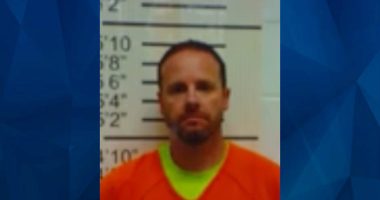
Tim Bliefnick (Law&Crime Network), Becky Bliefnick (family photo). Inset: Bliefnick returns to custody after his sentencing hearing (via YouTube screengrab/KHQA).
An Illinois man convicted in May of the home invasion murder of a nurse and mom of three boys amid a “brutal and contentious divorce” was sentenced Friday to life in prison without parole.
“You researched this murder, you planned this murder, you practiced this murder, you broke into her house, and you shot her,” Judge Robert K. Adrian said to Tim Bliefnick before counting loudly from one to 14, each number said loudly and clearly, to emphasize the number of bullets Bliefnick unloaded into his estranged wife. “I don’t know how long it took you to do that. Some of those shots were fired while she was lying on the ground. And you did all of that while your children were upstairs at your house laying snug in their beds.”
Adams County jurors heard at trial that Bliefnick, a 40-year-old former Family Feud contestant and local college football star, shot 41-year-old Becky Bliefnick 14 times after breaking into her Quincy home. Prosecutors argued the killing was premeditated, with testimony showing Tim Bliefnick conducted substantial research on the internet on how not to get caught. Ironically, those efforts to avoid law enforcement detection ended up serving as some of the most powerful circumstantial evidence against the first-degree murder defendant.
Tim Bliefnick ultimately declined to testify at trial, and he didn’t speak at his sentencing hearing on Friday.
Several members of Becky Bliefnick’s grieving family, however, did speak, offering poignant, emotional victim impact statements.
“You took from your boys the person who loved them the most on this earth,” Becky Bliefnick’s mother, Bernadette Postle, said. “You replaced their mother’s love with emotional scars and trauma.”
“Every video of her laugh makes me forget for a moment, makes me foolishly hope for a moment that I will wake up from this reality, a reality that is so impossible to accept,” said Becky Bliefnick’s sister Sarah Reilly, who looked directly at the defendant multiple times as she made her statement from the witness stand. “She was my only sister, my best friend. I loved her and continue to still love her with every ounce of my being. She is irreplaceable. I am left here living with and locking away my own suffering so I can move forward with my life for the sake of my family, for the sake of the boys, because Becky would not want our pain to give you any further satisfaction.”
While defense attorney Casey Schnack asserted at trial that there was “literally no evidence in this case, folks, that Tim committed this crime,” Adams County Assistant State’s Attorney Josh Jones drilled down on small details to paint a clearer picture of the case.
Prosecutors said evidence showed the defendant used a burner phone to buy a “blue bike with no reflectors” that appeared on a grainy video on the night of the murder. That burner phone also contained evidence of Bliefnick’s internet searches.
Bliefnick rode that bike to Becky’s home, knowing that she would be there alone and pried open his son’s empty bedroom window with a crowbar “just like he read on the internet,” Jones said.
“The defendant looked down at her, looked her in the eye and shot her 14 times,” Jones said. “He shot her with a gun with a homemade silencer that he read about on the internet.”
The prosecutor said that the eight shell casings found around Becky’s body matched 27 shell casings that were later found in Bliefnick’s home.
“They were fired by the exact same gun,” Jones said of all the shell casings.
The prosecution said that the “John Smith” who purchased the blue bike with no reflectors had long brown hair, as Bliefnick had at the time of the murder. He bought a black Mongoose bike that was in Bliefnick’s garage. John Smith drove an orange rust CR-V, like Bliefnick, and got notifications on his phone about the blue bike with no reflectors that was “sold to a tall, athletically built man,” said the prosecutor.

Tim Bliefnick mugshot, Adams County Jail
“Do we have to look outside to know that it’s raining?” Jones asked jurors. “We know who John Smith is and we know what John Smith did.”
Read Related Also: Body Found In Search For Missing 2-Year-Old Whose Father Allegedly Lied About Kidnapping
The prosecutor emphasized that every single time that this individual — the defendant — rode the bike it just happened to be the case that Tim Bliefnick’s cellphone, laptop, and WHOOP armband “mysteriously” showed no activity at all relevant times, including when the murder took place.
On Feb. 13, 10 days before the murder, Becky’s new boyfriend Ted Johnson visited her home. There was no search on Bliefnick’s computer from 2:02 p.m. until 1:10 a.m.; he made a phone call at 7:38 p.m. and did not do so again until 1:32 a.m., the prosecutor said. Meanwhile, the defendant’s fitness-tracking WHOOP device lost connection around midnight and “mysteriously reconnects” around the time he conducts some 200 internet searches over 38 minutes, as the prosecution told it.
“How do I find the owner of a license plate,” was one such search. Jones said that the 1:32 a.m. phone call that followed was to the Missouri Department of Records, seeking to identify the person behind the license plate number and their vehicle’s VIN number.
The prosecution noted that the defendant must have been present outside of Becky’s home and saw Johnson’s car parked there.
“He started to lose his mind,” just as Becky predicted, Jones said.
The prosecution said the investigation established that the defendant had an “empty gun safe” and that there was “no laptop activity at these times when we see these bike rides.”
“Every time we see that person on the bike we don’t have cellphone activity, we don’t have computer activity and his WHOOP is mysteriously and coincidentally disconnected,” Jones said. “What more do you need to see?”
Then Jones showed jurors Google searches, like: “how to force open my door with a crowbar”; “Average Quincy, Illinois police response time”; “How can I check if a gun is registered to me”; “Does my WHOOP record the exact times I wear it?”; and “Can you just wash off gunpowder residue.”
At trial, defense attorney Casey Schnack countered that the state’s case was “dripping with sympathy and lacking in any hard evidence.”
“Sympathy should not enter in your deliberations, and it is not something that should be considered by you when you go back to that jury room,” Schnack said. “We all feel sorry for Becky and we all feel sorry for her family. This is sad. When somebody dies, it’s sad. When somebody dies with kids, it’s sad. When somebody dies tragically, it’s sad. But we’re not here to decide if this is sad. We’re not here to prey on your sympathy.”
Schnack told jurors earlier in the trial that prosecutors could only prove that crucial surveillance videos of the bike rider merely showed “somebody going somewhere.”
“But that’s all the video shows. You don’t know if this is a man or a woman. You don’t know if they’re young or old. We don’t know what race they are. We don’t know how tall they are. We don’t know how much they weigh. We don’t know what colors they were wearing. We don’t know where they were coming from. We don’t know where they were going. Heck, we don’t even know if this is the same person on each of these videos that you are going to see,” Schnack said.
Jurors were ultimately persuaded by the state’s case and found Tim Bliefnick guilty hours after beginning deliberations.
The case first made national headlines after it was revealed that Tim Bliefnick and his family members appeared on the popular game show “Family Feud” in 2020. During the show, host Steve Harvey asked Bliefnick about the biggest mistake a person makes at their wedding. “Honey, I love you, but: Said I do,” Timothy Bliefnick said.
“Not my mistake,” Bliefnick attempted to walk the comment back. “I love my wife.”
“I’m gonna get in trouble for that aren’t I?”
Have a tip we should know? [email protected]









